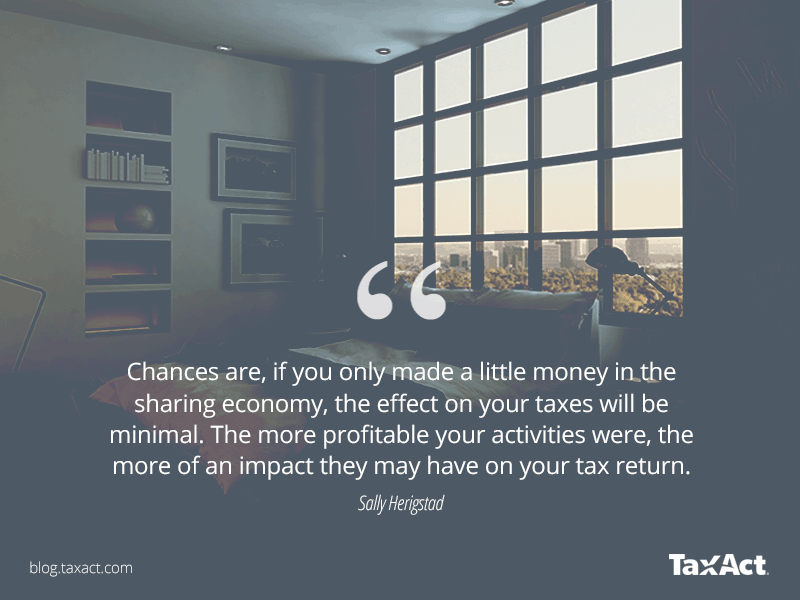Taxes and the Sharing Economy — Here’s What You Need to Know


File your business taxes with confidence.
Backed by our $100k accuracy guarantee.
It’s so easy to make a little cash now.
Rent a room on Airbnb. Drive someone around town by Uber or Lyft. Sell used books and DVDs on Amazon, or a piano on eBay™.
It’s all good – until you get a tax bill you weren’t expecting.
Then you get a Form 1099-MISC or 1099-K in the mail, and it dawns on you that the IRS expects to see this income on your tax return.
Chances are, if you only made a little money in the sharing economy, the effect on your taxes will be minimal.
The more profitable your activities were, the more of an impact they may have on your tax return.
Here’s how certain types of income affect your taxes:
Renting your home (or part of your home) for 14 days or less per year
If you want to rent out your home for occasional cash, and you don’t want to be bothered with recordkeeping, just make sure you don’t rent your home out more than 14 days per year.
Assuming you live in the home more than days yourself, you can rent your home out for a few days here and there and not even report the income on your tax return.
You can still take your mortgage interest and property tax deductions if you itemize.
You can’t deduct expenses related to renting, such as cleaning and toiletry supplies, but this is still a great deal tax-wise.

Renting your home for more than 14 days
If you rent out your main home more than 14 days, and you live in the home more than the greater of 14 days or 10% of the number of days you rent the home, you’ll use Schedule E to report rental income and expenses on your tax return.
Your mortgage interest and property tax deductions will be allocated between your rental activity and your home.
You can also deduct any expenses related to renting the home.
However, you cannot deduct more total rental expenses than you receive in gross rental income for the house you also live in.
Providing services, such as using your car as a cab
If you’ve signed up to provide a service and get paid for it, congratulations! You’ve joined the ranks of the self-employed, and by default are generally considered to be a sole proprietor.
That means you must report your income for tax purposes.
Be sure to set aside a portion of the money you receive for income taxes and self-employment taxes, or you could be in for a shock come tax time. Tweet this
If you’re in the 25% tax bracket, for example, and you pay 15.3% in self-employment tax, that’s about 40% of your profit after expenses that you need to set aside to pay taxes.
Selling things on Amazon, eBay™, or other online service
If you sell household items, books you’ve read, and other things online, you probably won’t see any effect on your tax return.
Personal items usually sell for less than we paid for them new, so there is no profit. You can’t take a loss on personal items.
However, if you turn your basement into a warehouse and start really wheeling and dealing, you may need to report income to the IRS.
How you report the income depends on the type of item and how long you held it.
Long-term gain
For example, say you bought an antique hutch at a garage sale for $100. Two years later, you sell it online for $200. You generally have a long-term capital gain of $100 ($200 – $100 = $100).
You report capital gains on Schedule D and pay favorable long-term capital gains rates on your profit.
Short-term gain
If you held the antique hutch for one year or less, you still have a capital gain.
However, it’s a short-term gain, so you pay tax at the same rate you would pay on your other income (but no self-employment tax).
Full-fledged business
If you get really busy and set up a business selling online, you may be a sole proprietor. In that case, you report income and expenses on Schedule C.
You’ll have to pay income tax and self-employment tax on your income. The good news is that, as a self-employed person, you can also deduct more expenses from your income, too.
How do I know what income is reported to the IRS?
If you receive a Form 1099 from someone you did business with, the IRS has also received the same information.
This includes Form 1099-MISC for miscellaneous income and Form 1099-K for income paid by financial institutions (credit and debit card payments) and for income earned through online services.
The IRS is very efficient at matching income to taxpayer ID numbers, so make sure all the income reported to you shows up on your tax return or attach an explanation explaining why it should not.






